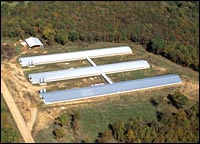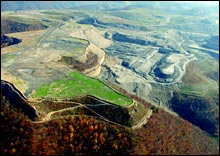health
-
Portraits of loss in the wake of Katrina
On a misty November morning in 2005, I was photographing in New Orleans’ Ninth Ward neighborhood a few blocks from where one of the levees had failed 10 weeks earlier. Squatting in a driveway in foul-smelling mud, adjusting the knobs on my camera, I stood up to stretch my back and noticed a man sitting […]
-
How poultry producers are ravaging the rural South
A person driving through the South might notice the chicken houses dotting the hills and flatlands. He might marvel at the larger ones, as long as a football field. He might react to their gagging stench for a moment, and then forget as he travels on. But those who live near the structures — stuffed […]
-
Mountaintop-removal mining is devastating Appalachia, but residents are fighting back
This article was originally published in Orion Magazine. Not since the glaciers pushed toward these ridgelines a million years ago have the Appalachian Mountains been as threatened as they are today. But the coal-extraction process decimating this landscape, known as mountaintop removal, has generated little press beyond the region. A mountaintop no more.Photo: Vivian Stockman/SouthWings.The […]
-
Only concrete alternatives will cajole people out of the suburbs
Often, the first step to helping people make better choices is showing them that there are choices.
One of the biggest and most important -- albeit frequently overlooked -- steps toward combating global warming, improving public health, reducing air pollution, and restoring a sense of community and fellow-feeling to American life is changing the structure of our communities.
Right now, conventional wisdom is that the choice is between suburbs -- big houses, plenty of privacy and safety, big, cheap retail readily available -- and tight, cramped, dangerous, dirty living in a city, with corner stores the only source of provisions. This perception is off, but it's not that far off. There are still too few concrete examples of dense, safe, mixed-use walkable communities with all the conveniences of the suburbs.
So, forthwith, Dave's Two-Step Plan for Cleaner, Safer Communities:
-
How can junk-food makers label goods laden with partically hydrogenated oil
Long a staple of industrial food processors, partially hydrogenated oils are widely known to have health-ruining effects.
After decades of looking the other way as study after study emerged documenting this phenomenon, the FDA is finally making moves to at least encourage consumers to avoid them. The industry is already retrenching, removing the vile stuff from popular junk-food products, often heralded by a "0 Grams Trans Fat" label on the package.
Restaurant chains such as McDonalds' own Chipotle Grill have followed suit. Archer-Daniels Midland and Monsanto have even forged an evil alliance to market a genetically altered, trans-fat-free soybean oil that mimics some of the properties manufacturers have come to love about partially hydrogenated oil.
Yet does any of this mean anything at all?
I ask because many potato/corn chip labels I've seen declare "trans fat free" in one place and then casually list partially hydrogenated oil on their ingredient lists. Don't believe me? Check this out.
From what I can tell, when a fat has undergone partial hydrogenation -- making it solid at higher temperatures, mimicking that grand and blameless ingredient, butter -- it becomes a trans fat. For practical purposes, trans fat and partially hydrogenated oil are synonymous.
How do they get away with it?
-
Reuseable menstrual pads are P.I.M.P.-in’
Squeamish boys should read no further. Sorry, fellas, it's not that kind of party.
As Umbra has pointed out, a lady's monthly menses doesn't have to be an environmental catastrophe (emotional catastrophe is another matter). Instead, it can be a party! It can be a Party in My Pants! It can be PIMPin', though in this case Jay-Z-style Big PIMPin' might be less than desirable.
Enthusiastic Grist reader Elka alerted us to this undercover fashion statement, pondering, "Hm ... should I snap on some martini glass PIMPs this morning, or perhaps some cowgirl PIMPs?" Party in my pants, indeed.
Check 'em out at health food stores and co-ops in the Midwest and Rainbow Grocery in San Francisco.
-
Avian-flu vaccine might or might not work
You might have seen our recent counter culture on avian flu, the latest head-scratcher for conservation-medicine buffs. In that article, we said there was no successful vaccine to fight the disease.
That's still true, but the U.S. is stockpiling one that "might" work. "I think the vaccine would give you partial protection," said its creator, Robert Webster. "It would probably protect you from death. You would probably get very sick but not die."
But don't count your chickens before they hatch.
-
Fast facts about avian influenza
3 — types of influenza virus (A, B, C)1 1 — type that can cause pandemics (A)1 1 — A-virus subtype currently freaking the world out (H5N1)1, 2 0 — successful vaccines against H5N1 avian flu currently available3 18 — people infected by avian flu in Hong Kong in 1997, the first case of direct […]
-
Umbra on composting feminine products
Dear Umbra, OK, the kitty-litter thing pushed me over the edge. I know you are sick of writing about gross, yucky things, but I had to ask: if kitty litter is compostable, what about biodegradable maxipads and tampons? One of the leading natural feminine-care brands touts their stuff as being biodegradable and compostable. Can this […]

